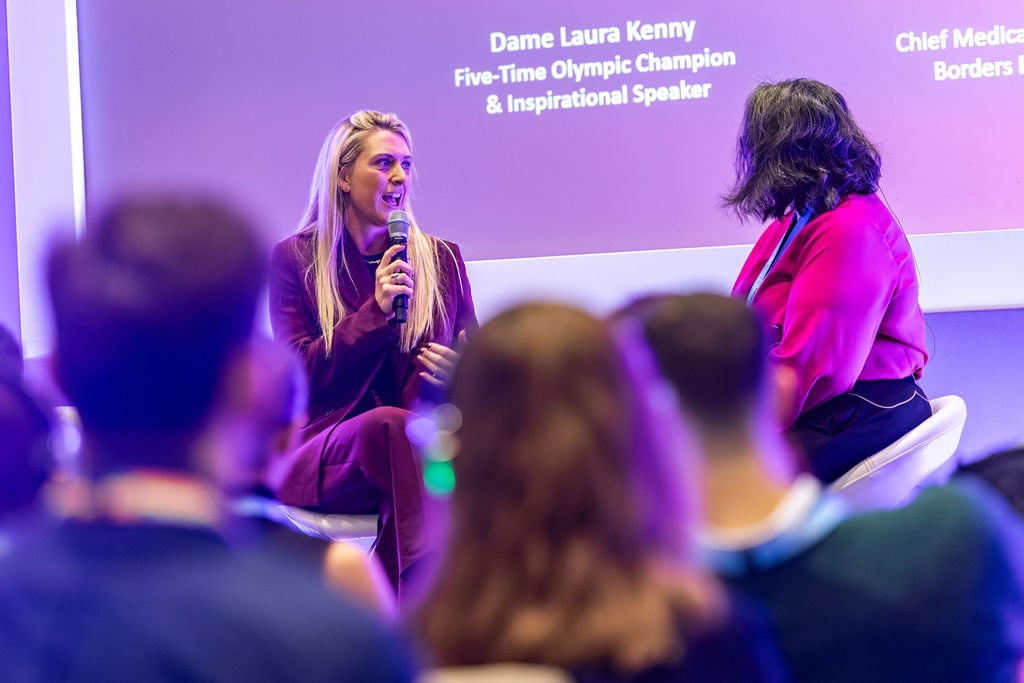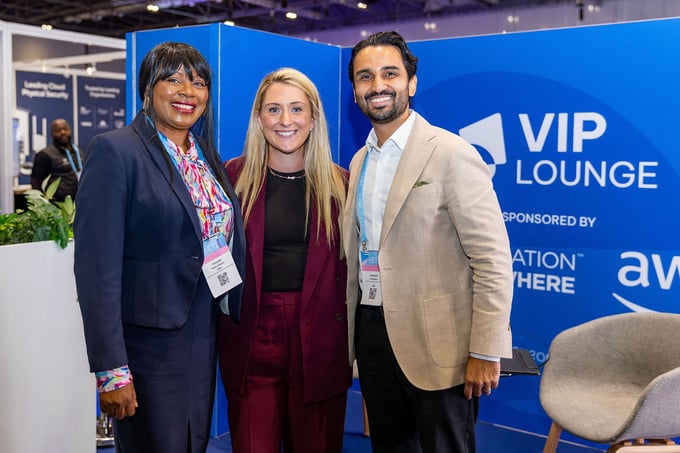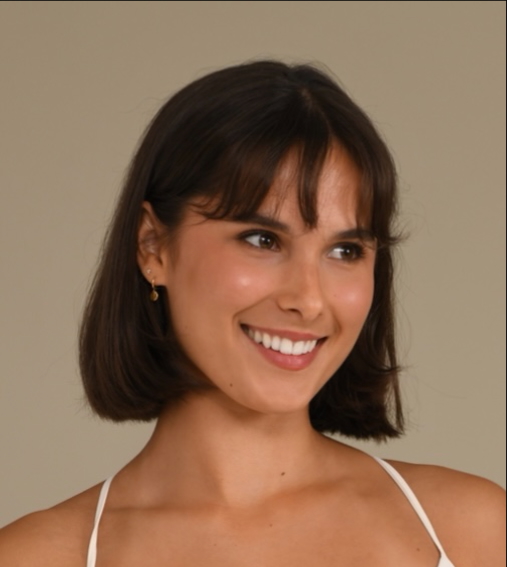HETT Show 2025 gave attendees a rare chance to hear from Britain’s most decorated female Olympian, Dame Laura Kenny.
In a fireside chat with Dr. Ayesha Rahim, Chief Medical Information Officer at Surrey and Borders Partnership NHS Foundation Trust, she opened up about her career in elite sport, reflecting on the challenges she’s faced and the determination required to stay on top.
She also shared insights from her personal health journey, describing how the NHS supported her when it mattered most. Throughout the session, themes of perseverance and teamwork mirrored those of NHS staff, showing that resilience stems from shared purpose.
Dr. Rahim kicked off the conversation by acknowledging Laura’s hard work, dedication, and skill, and asked what she considered the key ingredients for success. And for Laura, the foundation of success has always been holding herself to high standards, both on and off the bike.
“Time keeping for me is right at the top of my everyday life,” she explained. She described a “10-minute rule”: if a commitment is scheduled for 10 o’clock, she aims to arrive by 9:50. “The team can't function if people are late. I also think it’s quite rude if you turn up and you’re missing a piece of your team.”
Commitment, she said, is another non-negotiable. “When you commit to something as a sports person, you are fully a hundred percent committing to it. I won’t say yes to something unless I can give it my hundred percent because I just think you are letting people down.”
For Laura, being a team player is central. “The team to me means absolutely everything. If people turn up and they’re not motivated, or they’re carrying some baggage into the sessions, the session doesn’t run at a hundred percent. The only way you’re going to win a gold medal is if everyone is firing on all cylinders.”
Her approach to excellence hasn’t changed since stepping away from competitive cycling. The same principles guide how she approaches challenges today.
Dr. Rahim followed up on Laura’s reflections on commitment and standards by exploring teamwork. She noted the challenge of bringing together people from different backgrounds, each with their own perspectives, and asked what Laura had found most helpful in uniting a disparate group into a cohesive team.
Laura emphasised that communication was key to a successful team, and described the importance of setting clear principles at the start of each Olympic cycle. “We’ve all sat down at the beginning of the cycle and written down what we believe in as a team and what we believe would make the team successful. So we have key principles, and if anything goes wrong, you can hold people to your principles because you’ve all signed up to that.”
She was clear that being part of a team didn’t mean becoming best friends or spending all your time together outside training. Instead, she highlighted the need to understand each person’s personality and how best to communicate with them.
She shared an example from feedback sessions after training: “Feedback isn’t always positive… everything that we did or everything that we say was to improve the team’s performance, but you would have to think about the different personalities within the team and how that’s actually communicated.”
She said that understanding her teammates’ personalities had been a steep learning curve. “Without communication skills and without people being able to talk openly, you probably have trust issues with each other.”

She explained that investing in these relationships helped the team build trust and understanding. “I think our team was so open, and we were so open to learning about each other and what actually makes you tick.” Laura said this helped put everyone in the right frame of mind when stepping onto the Olympic start line, where the nerves are intense. “For me, that is what made our team so successful.”
Dr. Rahim followed up by asking how Laura approached feedback, particularly when it highlighted areas for improvement. She wanted to know how Laura could take criticism and channel it positively into performance gains.
Laura explained that she was naturally very hard on herself, always seeking ways to improve. Even when given a target, she described pushing beyond it. “If someone said… You need to average 350 watts for three minutes. I would go, well, I’m going to do 352 because 350 is just the baseline of it.” She added that even if she met the target, she would often feel she could have done more. “I just basically wanted to get to a point that nobody else could reach.”
For Laura, taking criticism was part of the process and a vital tool for growth. She welcomed constructive feedback, knowing that addressing it would make her faster and stronger. “I honestly would prefer someone to come up to me and say, I think you need to improve this, because I knew as an ultimate package it would make me better.”
Dr. Rahim then asked Laura about the setbacks she had faced in her professional life, acknowledging that the road to success is rarely smooth.
Laura reflected on her journey, noting that while some might attribute early success to luck, she saw it differently. She said she had always been motivated and driven: “I really wanted to be successful,” and at first, everything went super smoothly for her.
However, she recounted a serious crash during a crucial qualification race for the Olympics. After returning to cycling post-maternity, Laura needed to secure points to qualify for the next Games. In a race in Canada, she collided with another rider and was seriously injured.
“I came off and I just burst out crying… something is really wrong with my arm,” she explained. Doctors confirmed she had broken her shoulder blade in two places. Despite the severity of the injury, Laura chose not to have surgery, weighing the risk against her Olympic ambitions. “There are some risks that you have to take to be successful. For me, it was worth the risk,” she said.
She described the mental challenge of pushing through the pain and continuing to train, while knowing the stakes were immense. Even after a second crash at the World Championships (just four weeks after breaking her shoulder), she persevered.
Internally, Laura knew the Olympics were a no-go, yet she continued to show up for her team, whom she described as her second family. “You are literally going in every day pretending that you are really happy to be part of the team, knowing that you are not next on the start line.”
Ultimately, external circumstances gave her another chance. The postponement of the Olympics due to COVID-19 provided an extra year to recover and qualify, but the road back remained grueling. Laura described the process as the hardest comeback of her career, both physically and mentally, emphasizing the resilience required to overcome such setbacks.
Dr. Rahim asked Laura where her drive to persevere came from. Laura explained that her motivation varied across each Olympic cycle. “London 2012, everything was fun and I just rolled onto the track and maybe it was a bit of luck with that one… I was so young and almost naive to what I was about to go on and do.”
By Rio in 2016, her motivation had shifted. “I wanted to prove that it wasn’t easy and that it wasn’t just like a one-hit wonder. I wanted to prove that a lot of hard work went into that and that I could go on to be one of the best female endurance riders in the world.”
For Tokyo, the stakes were even more personal. After giving birth to her son Albi in 2017, Laura had to spend long periods away from him due to training and competitions.
“The amount of time that I sacrificed with my little boy was just insane… With the extra year [due to the Olympics postponement], I had to leave him for even longer. And it just had to be worth it… Every time I stepped into the velodrome, it was a hundred percent and nothing less because… I had to make sure that I was doing it for a purpose.”
Laura also credited her mother as a key source of inspiration. “I feel very lucky that my mum is a role model to me. She lost eight and a half stone in a year and a half, basically by changing her nutrition and taking up bike riding.”
She looked back on her mother’s determination and strives to be the same. But her motivation now extends beyond herself: she aims to be a strong, positive role model for her children.

Dr. Rahim then steered the conversation towards Laura’s personal struggles. She explained that, up until 2020, broken bones had been the worst setbacks she had faced, and she didn’t think much could be more difficult.
But in late 2021, she and her husband, Jason, experienced a miscarriage at nine weeks. Laura described it as devastating, particularly as she had to consider returning to cycling quickly in order to maintain funding.
Shortly afterward, she contracted COVID-19 and initially attributed her severe symptoms to the virus. When unusual bleeding followed, she contacted her GP, insisting on being seen despite the restrictions of the pandemic. Laura was diagnosed with an ectopic pregnancy
For a brief moment, she felt a glimmer of hope after a faint positive HCG test, but it was quickly replaced by the reality of needing urgent surgery. Despite the shock and intensity of the situation, she credits the support and professionalism of the NHS staff.
“One nurse came up to me and said, ‘What do you want? What will make you feel better?’… I just said, I just want to see Albi, and they brought him in through the back door. Just seeing him for those 90 seconds… I felt relaxed, and I just thought that one doctor literally changed my mindset within seconds.”
Laura reflected on the experience with gratitude, not only for herself, but for her husband and family. “Honestly, I just thank them, not just for my sake, for ours, but also for Jason’s sake. He was so scared… it was absolutely fantastic.”
Dr. Rahim then invited Laura to reflect on other touchpoints she had experienced with the NHS throughout her life.
Laura shared that her connection with the health service began at birth. She was born four weeks premature and spent the first six weeks of her life in intensive care after suffering a collapsed lung.
“The care that my parents received during that time was incredible,” she said, explaining that she has since met the doctor who treated her as a baby. “It was quite a surreal moment,” she recalled. “Without his care and attention, I definitely wouldn’t be where I am today.”
She explained that the doctor had offered advice that would ultimately shape her future. He told her parents not to fear sport despite her early breathing difficulties: “He said, ‘Put her into sport, put her into swimming… it helps build lung capacity.”
It was through swimming, Laura explained, that she met the people who first introduced her to cycling. “So without him… I probably wouldn’t be sitting here today.”
Dr. Rahim observed that Laura’s determination in later life appears to have roots in her early experiences, both with healthcare and in sport.
Laura credited her parents with nurturing her talent and supporting her journey into cycling. “I give my mum and dad all the credit in the world,” she said. “Without them at the very start of the journey, I just wouldn’t have been into cycling.”
She emphasized that her parents encouraged her subtly, recognising her potential without forcing her into a sport that didn’t suit her personality. “If it’s not the sport for you, you can’t force a child into it. But my mum and dad had a lovely way of keeping me in contact with the cycling world,” she explained.
Although Laura initially preferred trampoline, her parents made sure she stayed involved in cycling through gentle encouragement and social opportunities. “Once you make a friendship group in a sport, that’s really where the drive comes from. I wanted to go because I wanted to see my friends, and then I got scouted through the cycling system.”
Dr. Rahim noted that it was inspiring to see how Laura had channelled her experiences into something positive. Beyond her sporting achievements, Laura now uses her platform to advocate for women in sport and as an ambassador for tackling bias in physical health.
Laura explained that she feels a strong sense of responsibility to use her voice for good. “I truly believe if you’ve got a platform, you should use it,” she said. “It would be so easy these days to only post the good and promote what you think people want to see, but for me, my platform is a way of helping people.”
She described how openness and honesty have become central to her approach, particularly when speaking about difficult subjects like miscarriage. “It only takes one person to open up about how they truly feel, and so many others will then start opening up too... That’s really what my social media is.”
Laura also spoke about her work challenging bias in physical health. She encourages people to be proactive when seeking medical help, ensuring they communicate clearly about their needs. “You can’t come to a healthcare worker and expect them to be a mind reader.” She said to go in with your tools. Write things down, explain what’s going on. “People can’t just assume how you’re feeling.”
For Laura, the goal is simple but powerful: encouraging more open conversations about both the good and the bad. “If everyone could just talk a bit more, we could help people be in a much better mindset.”
Dr. Rahim then asked Laura, looking back on her incredible career and life, what she was most proud of.
“The obvious one is the kids,” Laura said. “Although they keep me up at night, they’re my whole world. Everything about them is absolutely brilliant.”

With regards to cycling, she said the achievement that meant the most to her was returning to win gold after becoming a mother. “I really wanted to be one of the only British females to come back post-childbirth and win a gold medal. The journey was just so much harder than I ever anticipated,” she said.
“It would’ve been so easy after Rio to say job done and stop at four,” she added. “But I just wanted to prove to women that we can juggle both. I’m not saying it’s easy, but we can come back and be successful.”
Dr. Rahim ended the session by asking Laura to share a few words of wisdom for the NHS staff in the audience, many of whom are used to achieving great things under challenging circumstances.
Laura said her advice echoed much of what she had already spoken about. “There is no journey that doesn’t come without hurdles,” she said. “If you think it’s going to be smooth sailing the whole time, you’re kind of living in a dream world. Life’s not like that.”
She acknowledged that everyone faces personal and professional challenges, but encouraged people to see obstacles as temporary rather than defining. “Every hurdle, every barrier can be broken down… Never see anything as a roadblock,” she said.
Laura ended by stressing the value of teamwork and communication. “Actually taking the time to know the people you’re working with has always been key to my success.”
Don't miss next year's show taking place on 29th - 30th September 2026. Click below to register your interest.

Written by Lexie Corner, Content Writer
%20(1).png?width=500&height=58&name=HETT%20insights%20logo%20RGB-04%20(1)%20(1).png)

